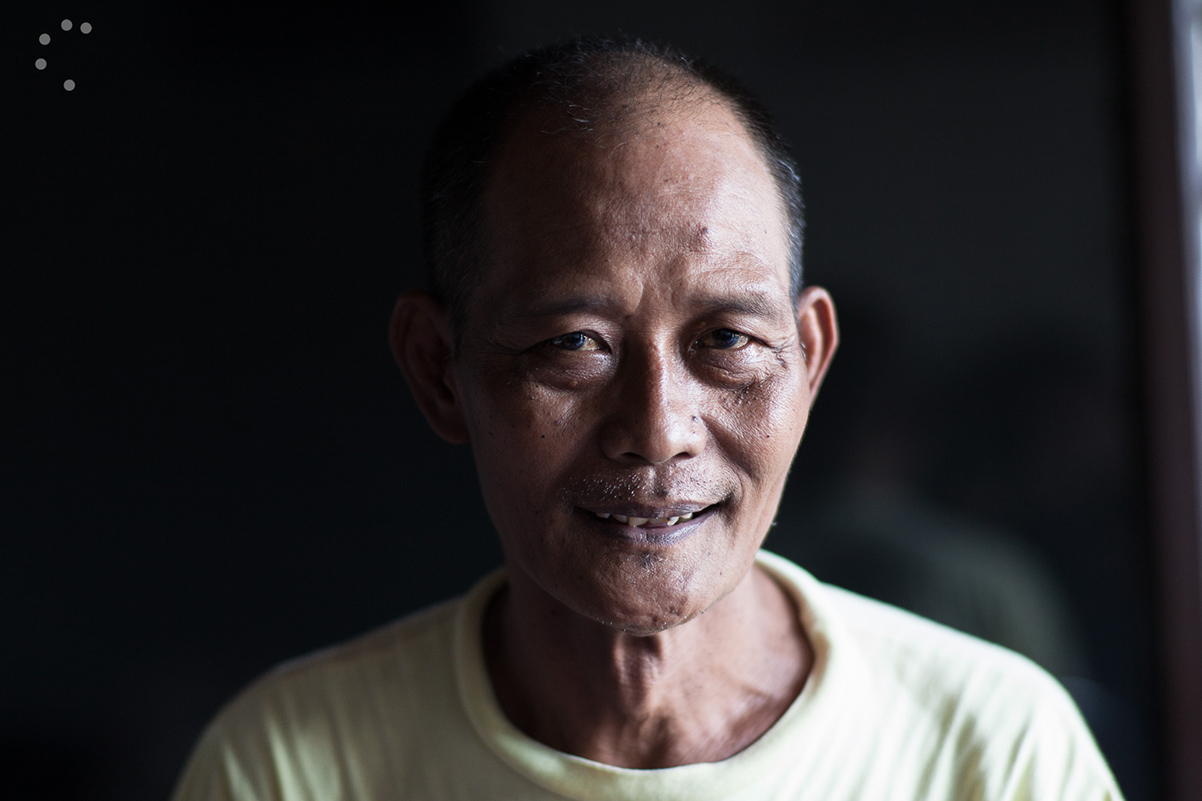One day in early 2007, a car rolled up outside the home of Marianto Sumarto, the sawmill owner who had helped Darwan get elected. He lived in Kuala Pembuang, a small coastal town that serves as Seruyan’s capital. Marianto recognised the man behind the wheel as a government official, as he rolled down the window to hand over a bundle of papers.
“Take a look at these – there are some issues,” the man said flatly, before driving off.
When Marianto examined the dossier, he found copies of plantation permits Darwan had given to a handful of companies, with a list of directors and company addresses. He immediately recognised the names of some of Darwan’s relatives. Among the addresses, he noted the Kuala Pembuang home of Darwan’s brother.
“I don’t know why he brought me that data,” Marianto told us earlier this year, sitting outside the same house where he had met the whistleblower. “Maybe he cared about Seruyan and wanted to right the ship. Maybe he felt disappointed with how things were going and thought I’d be brave enough to do something about it.”
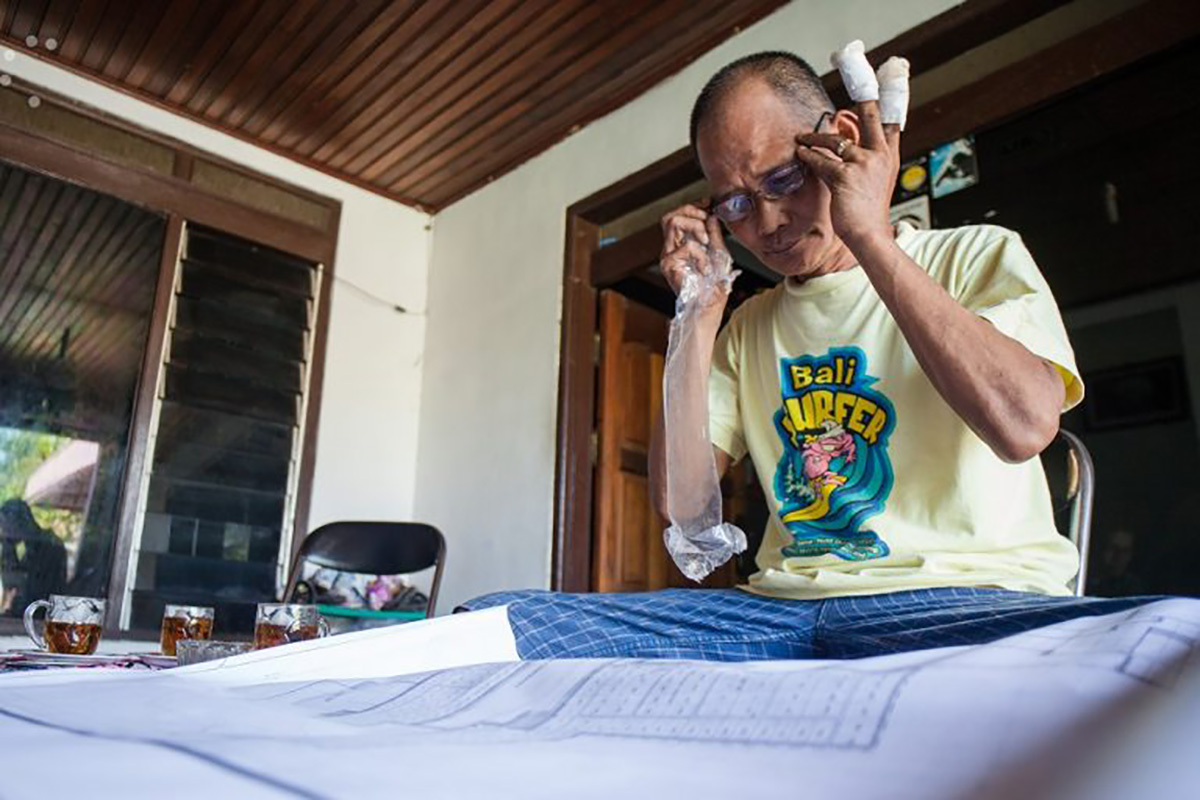
Marianto examines an oil palm concession map at his home in Kuala Pembuang.
A migrant from the island of Java, Marianto had arrived in Kalimantan in 1985, joining a friend’s shipping company before switching over to a Malaysian-run timber outfit. He learned on the fly, eventually striking out on his own as an “illegal logger,” as he put it.
“Maybe he felt disappointed with how things were going and thought I’d be brave enough to do something about it”
When Seruyan formed, Marianto became head of the PDIP party within the new district, at the same time that Darwan was leading the party in neighbouring East Kotawaringin. He joined his campaign to become bupati, in 2003, and his brother-in-law became Darwan’s first deputy. But by the time he met the whistleblower, Marianto had soured on Darwan’s rule. He felt he had betrayed the hope that Seruyan would be developed for the benefit of its people. The plantations he had allowed to flood in were having the opposite effect. “That’s what I saw,” Marianto told us. “Maybe I’m the most critical person in this district.”
Wiry and tall, Marianto had a bald head, a raspy voice and a grin that curled upward. When we met, two of his fingers were wrapped in gauze; he had damaged them in a car accident a few days earlier and lost both fingernails. His nickname, Codot – meaning “bat” – was a relic from his days in an amateur rock band in the 1980s. “I know just about everyone in Seruyan,” he declared. “And everyone in Seruyan knows of me.”
A few days after the leak, Marianto and a friend made the four-hour drive to Sampit, to check out a collection of other addresses in the documents. He recognised the first as the home of Darwan’s son, Ahmad Ruswandi. They had held campaign meetings there in the run-up to his selection as bupati. Once or twice Marianto had stayed the night. He knew the next one too. It belonged to Darwan’s tailor, who had made their PDIP party shirts.
“The thing is, our country is a corrupt country,” Marianto told us. “A lot of public officials, they didn’t want to bring Seruyan to life. They just wanted to suck it dry.”
The Gecko Project and Mongabay pieced together the story behind Darwan’s licensing spree based on stock exchange filings, government permit databases and company deeds. More information and testimony were provided by Marianto, and a local activist named Nordin Abah, who separately investigated Darwan around the same time as Marianto. We corroborated our findings in interviews with people involved in several of the companies.
The picture that emerges is an elaborate and coordinated scheme to establish shell companies in the names of Darwan’s relatives and cronies, endow them each with licenses for thousands of hectares of land, and then sell them on to some of the region’s biggest conglomerates. Those involved stood to profit to the tune of hundreds of thousands, possibly millions of dollars. If the plan was carried through to completion, it would transform almost the entire southern stretch of the district, below the hilly interior, into one giant oil palm plantation. If Darwan had his way it would be possible drive 75 kilometres east to west and 220 kilometres south to north through a sea of palm.
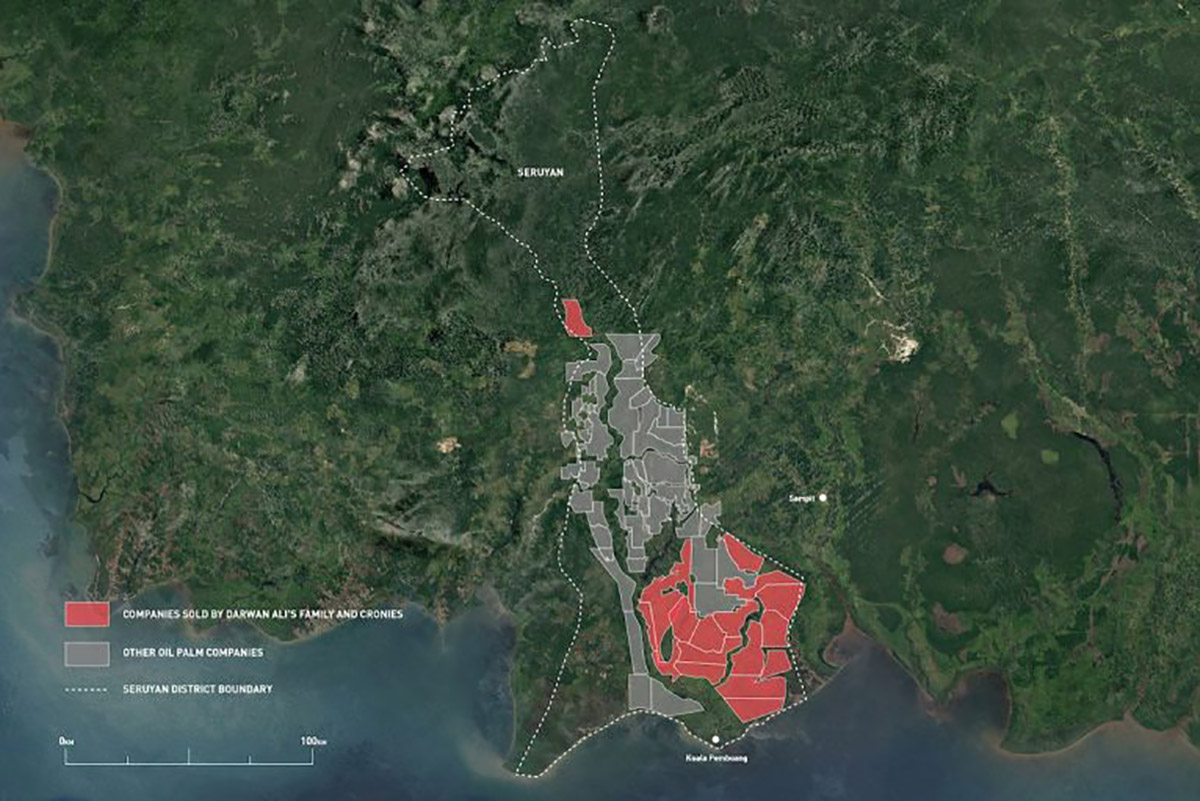
Licenses issued to companies owned by Darwan Ali’s family and cronies threatened to turn the southern reaches of Seruyan into one vast oil palm plantation.
The scheme involved a cast of more than 20 people who appeared as directors or shareholders in the shell companies. They included members of Darwan’s family, associates from his time as head of a building contractors association, members of his election campaign team, and at least one person who said his name was used as a front.
“A lot of public officials, they didn’t want to bring Seruyan to life. They just wanted to suck it dry.”
Darwan’s wife, Nina Rosita, was a shareholder in one. His daughter Iswanti, who would go on to serve as a provincial politician herself, was a director and shareholder in one, a shareholder in a second and director of a third. His daughter Rohana was also a director. His son Ruswandi got a more prominent role, as director of several companies and a shareholder in at least one more. His older brother Darlen had two companies, his younger brother Darwis one. It stretched into his extended family, through Darwan’s nephew and the husband of his niece.
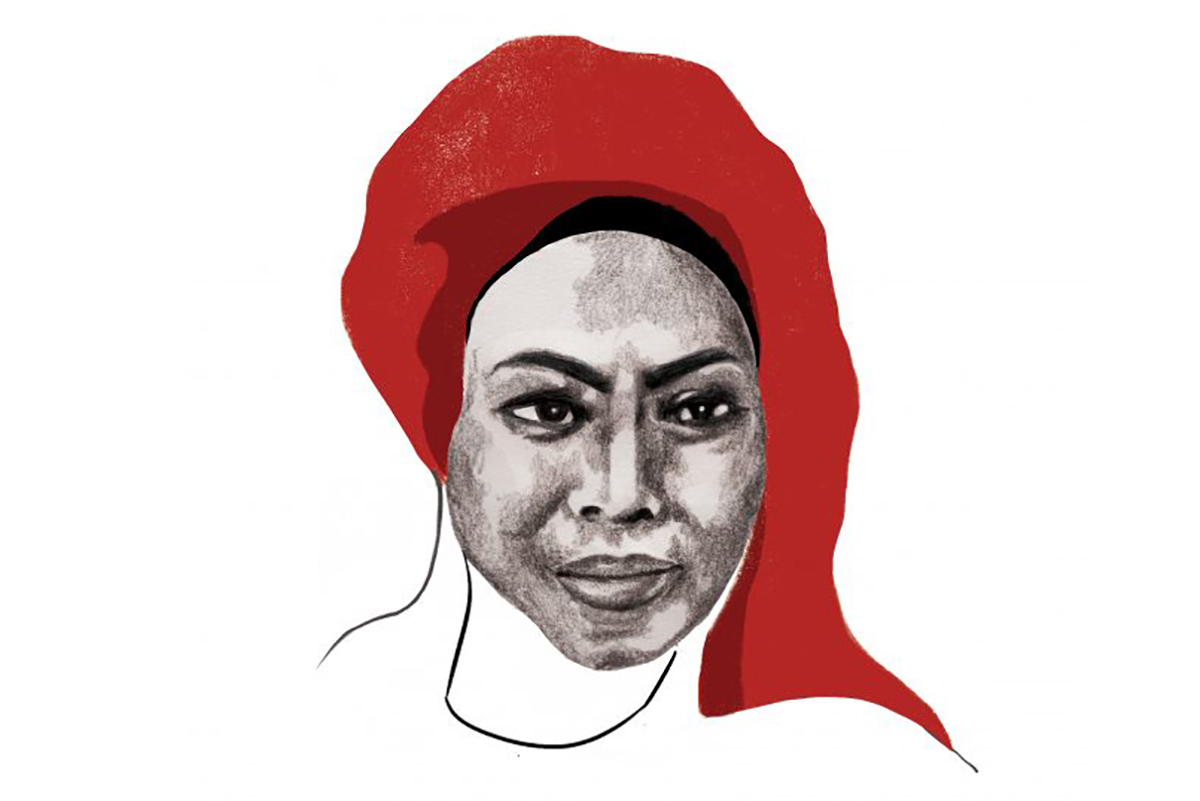
Iswanti, Darwan Ali’s daughter
In total, we identified 18 companies that connected to Darwan. Three were incorporated several years before he became bupati. That shows that his interest in large-scale oil palm predated his political career, but that it had stalled: the companies remained inactive until after he assumed office. Two more were formed in 2004, a year into his reign, and then in early 2005 the real flurry of activity began.
Five companies cropped up in a two-day window in late January; another appeared two weeks later. We were able to determine the directors for all of the companies, and the shareholders for all but six.
Almost all of the companies involved at least one of Darwan’s family as a shareholder. His name did not appear on any of them, but Marianto came to the view that he was coordinating the scheme. “They’re like pawns on a chessboard,” he said. “Darwan moves the pieces.”
Most of the names were used sparingly. But some cropped up more often than others, and these would provide important clues as to how the scheme functioned. The first was Vino Oktaviano, who was named as a shareholder in three companies set up on the same day, and a director in one.
Nordin Abah, the local activist who carried out his own investigation of Darwan, happened to know Vino well; they sent their children to the same school and sometimes met for coffee. In the wake of the scandal around BEST Group and the national park, Nordin sought out the names behind Darwan’s permit spree. When he found Vino’s name, he challenged him over it. Vino told Nordin that Darwan had used his name, and that he had no actual role in the companies.
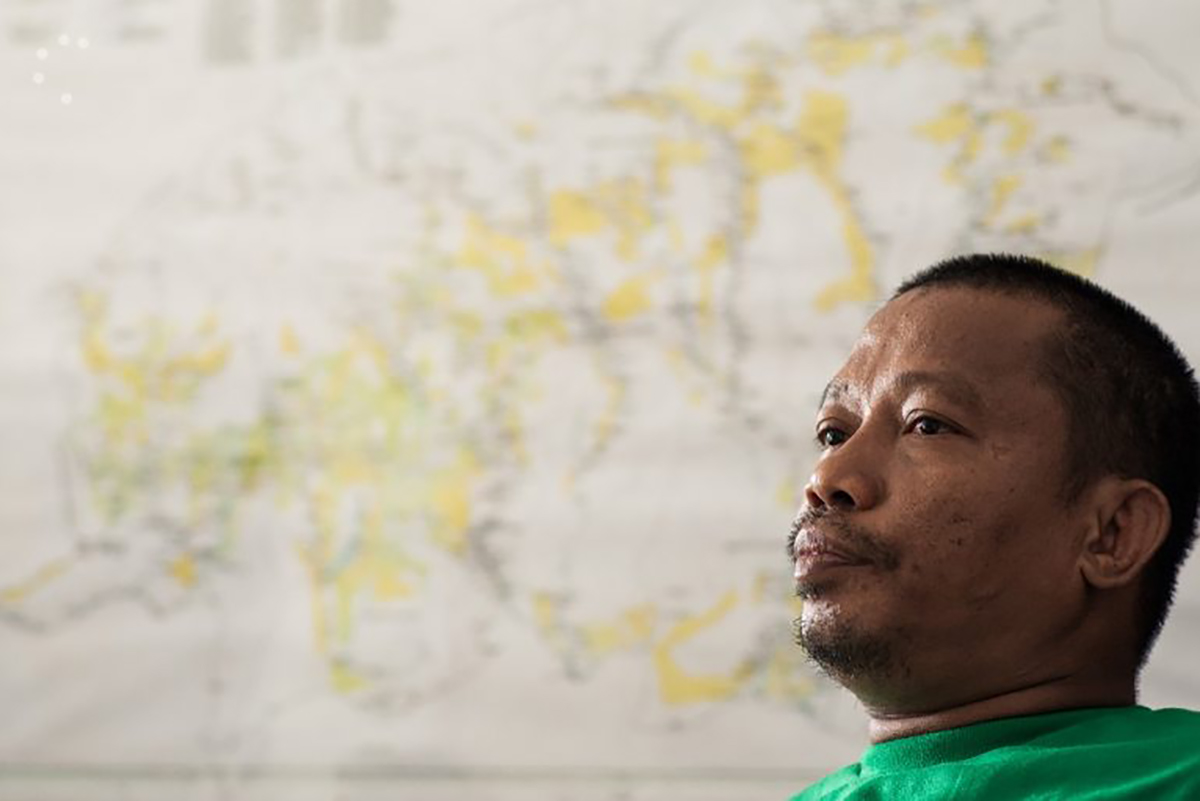
Nordin Abah sinks into the memory of his investigation during an interview in January.
“He thought it was normal, that nothing would come of it,” Nordin told us at the Palangkaraya office of his NGO, Save Our Borneo. “He just didn’t want to take any responsibility for it.”
Vino worked as a building contractor, obtaining jobs from Darwan’s administration, and was a nephew of Darwan’s wife. The name of his boss, a confidante of Darwan’s from his days in a trade association, also appeared in company documents.
“You’re going to go to jail Vino, if this thing blows up,” Nordin recalled telling him. “They made me do it, Din.” Vino replied. “I was tricked.”
Where Marianto was a political insider, a mover and shaker in the logging game who soured on the man he once considered an ally, Nordin was a campaigner who hounded the palm oil companies ravaging Seruyan. He also had strong connections to and within the district. His uncle had served as the regional secretary, the highest position in its civil service. On Darwan’s trail, he set about tapping his own relatives in the bureaucracy for leads. He had managed to uncover most of the names involved, noting like Marianto that many of the addresses to which the companies were registered were either duds or owned by the bupati and his family.
“They’re like pawns on a chessboard. Darwan moves the pieces.”
Nordin observed that a plantation company would need to operate a factory to mill the fruit, and Vino “couldn’t even run a tofu factory”. He was adamant that other people had been used in the same way. “You might be a teacher, you might be a journalist, you might be a contractor – there’s no way someone like that can get a permit for a plantation,” Nordin explained. “You don’t know how to develop an oil palm company. And you don’t have the money. It’s just for selling. The story is, I use your name to make a permit to sell to someone else.”
The name Ambrin M Yusuf appeared as director of one of the companies. Nordin identified him as a confidante of Darwan from their time in the East Kotawaringin builders’ association. We tracked him down to his house in Kuala Pembuang, where he had recently returned after serving a jail term for his role as a bag man delivering cash in a local bribery scandal.
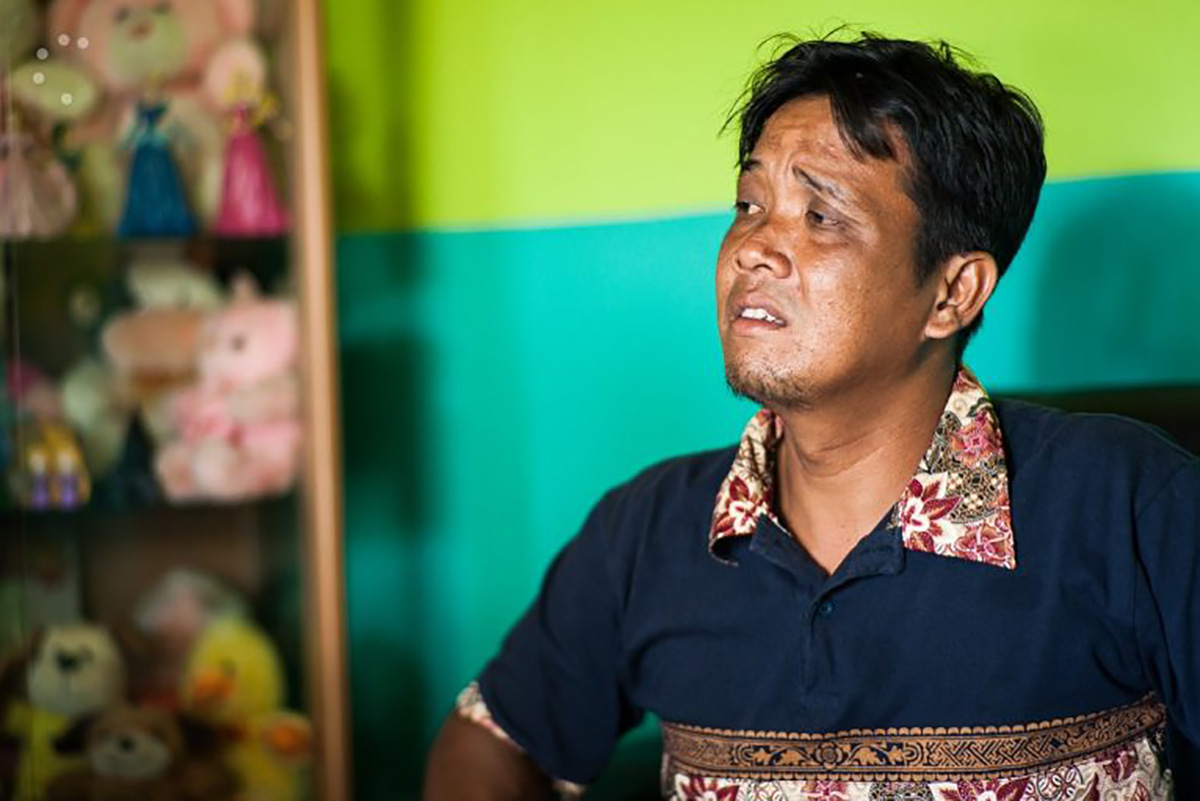
Ambrin M Yusuf at his home in Kuala Pembuang.
He admitted to being a political ally of Darwan, and said that intermediaries had asked him to put his name to the company. But he claimed, implausibly, that he had turned them down, and that the person named in the documents was another man with the same name. He nevertheless admitted that it was “normal” for a bupati to give permits to a family member.
Yusuf and Vino’s stories suggested that cronies were being used as fronts, potentially to keep someone else’s name – the true beneficiary – off company documents. Nordin and Marianto believed that other people whose names appeared were more complicit. They both pointed to a man named Khaeruddin Hamdat as a central figure.
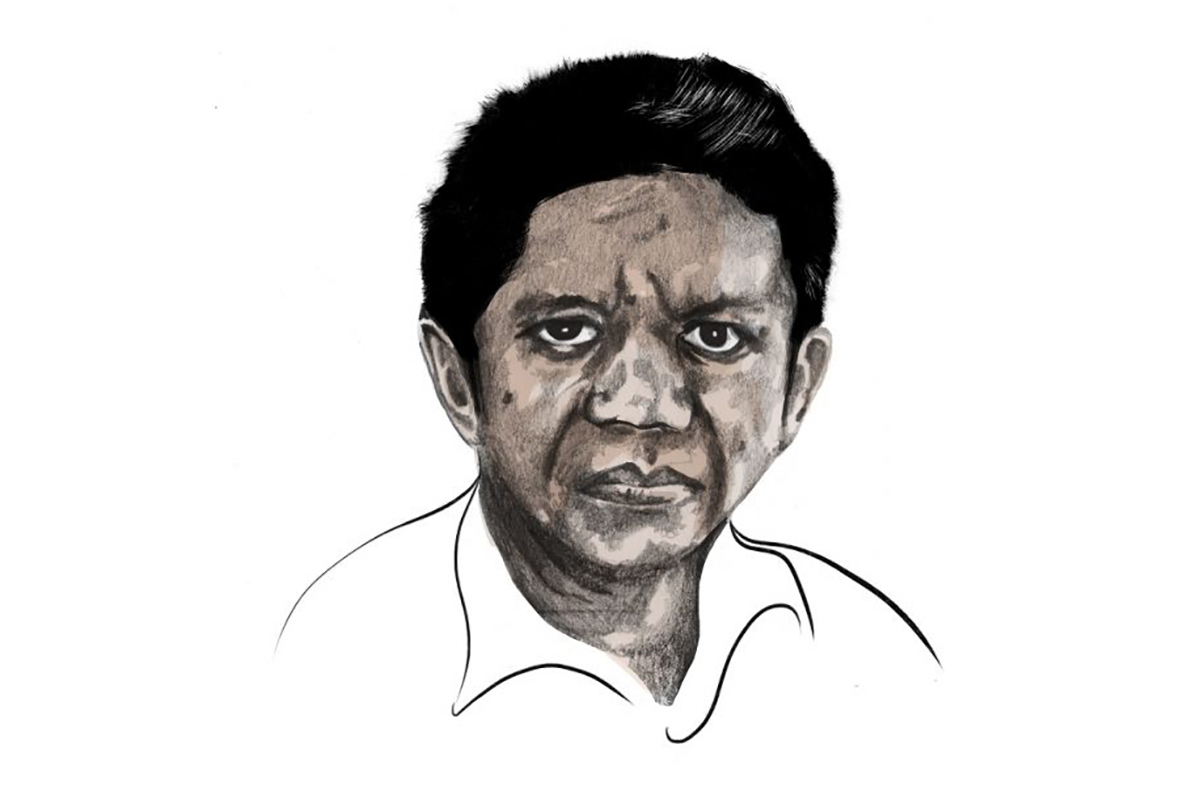
Khaeruddin Hamdat, alias Daeng
Khaeruddin appeared as director of three of the companies, though never a shareholder. Marianto, Nordin and others identified him as Darwan’s “adjutant”. It is a term commonly used in Indonesia for the person who serves variously as the advisor, right-hand man and fixer for important politicians. Known as Daeng, an affectionate term for a man from his home island of Sulawesi, Khaeruddin was only in his mid-30s by the time the companies were formed. Nordin described him variously as the “boss in Jakarta” and Darwan’s gatekeeper, meeting with palm oil executives in a posh hotel in the capital. (Khaeruddin declined to comment for this article.)
“Because Darwan has to protect himself,” Nordin said. “No way he uses his own name to cut a deal.”
Most of those involved in the scheme proved to be elusive or declined to comment when they got a sense of what we were asking questions about. But one of the few people we knew for sure where to find was Hamidhan Ijuh Biring. He had been jailed for yet another corruption scandal, and we tracked him down to a prison on a main boulevard in Palangkaraya, the provincial capital.
“It’s just for selling. The story is, I use your name to make a permit to sell to someone else.”
Hamidhan’s name appeared as a director and shareholder of one of the 18 companies. He was also married to Darwan’s niece. He told us that he had set up the company and received a license from Darwan, but lacked the capital to develop a plantation. Darwan encouraged him to sell the company to a political ally in Jakarta who also served as director of an existing plantation company in the district. After the deal went through, Hamidhan received one portion of the payment but the second, he later discovered, went directly to Darwan. “It turns out Darwan was inside, telling him, ‘No need to pay Hamidhan’,” he said bitterly.
Before his relationship with Darwan soured, Hamidhan was an insider, campaigning with him ahead of his 2008 re-election bid. He corroborated Nordin and Marianto’s claim that Khaeruddin Hamdat served as Darwan’s adjutant. He said that whenever he met the bupati, Khaeruddin was there with him. – to be continued.
Photos by Leo Plunkett, Sandy Watt, Tom Johnson and Sam Lawson. All other illustrations by Sophie Standing.
This article was curated jointly by the environmental news website Mongabay and The Gecko Project, an investigative journalism initiative established by Earthsight. The article is part of an investigative series entitled Indonesia for Sale.
Recommended stories:
